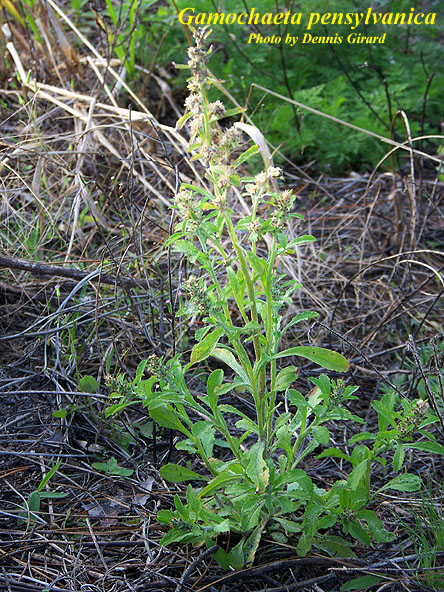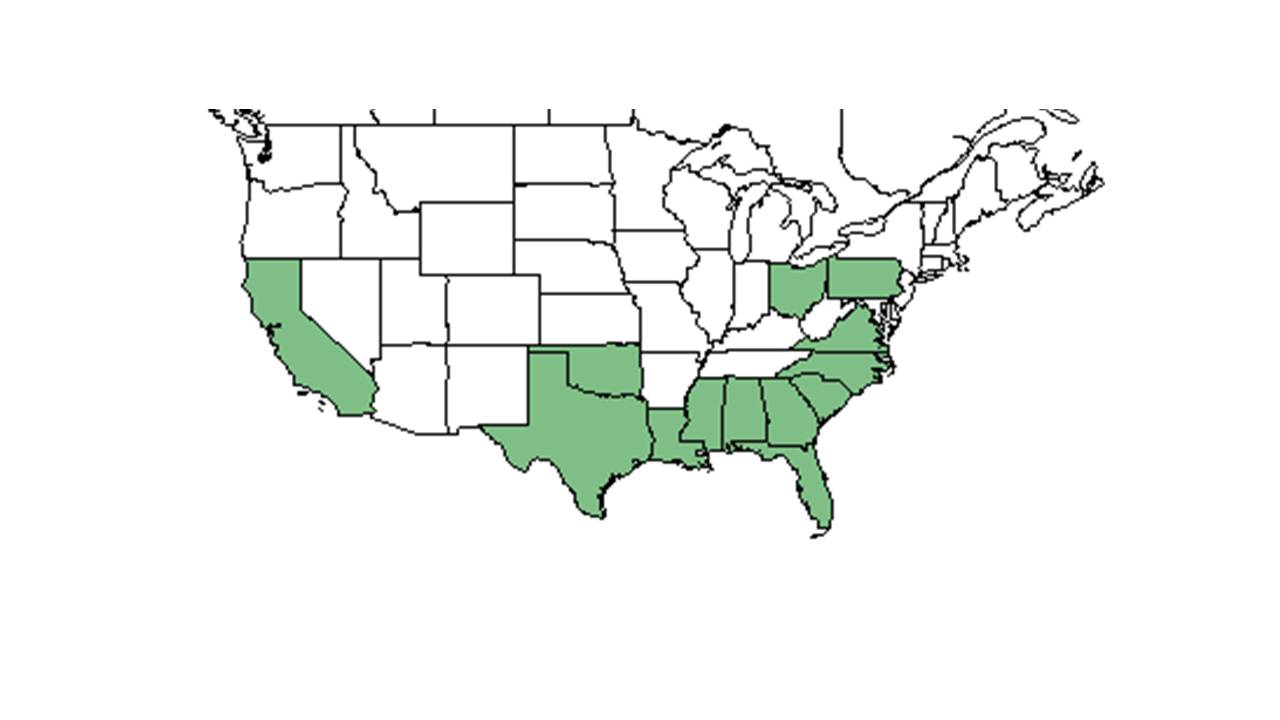Difference between revisions of "Gamochaeta pensylvanica"
(→Taxonomic notes) |
|||
| (7 intermediate revisions by 5 users not shown) | |||
| Line 20: | Line 20: | ||
Common name: Pennsylvania everlasting | Common name: Pennsylvania everlasting | ||
==Taxonomic notes== | ==Taxonomic notes== | ||
| − | Synonyms: | + | Synonyms: none<ref name=weakley>Weakley, A.S. 2020. Flora of the Southeastern United States. Edition of 20 October 2020. University of North Carolina at Chapel Hill, Chapel Hill, North Carolina.</ref> |
| + | |||
| + | Varieties: ''Gnaphalium peregrinum'' Fernald<ref name=weakley/> | ||
==Description== | ==Description== | ||
| Line 27: | Line 29: | ||
==Distribution== | ==Distribution== | ||
| + | This plant is a native of South America. In North America, it's found east in Pennsylvania, south to Florida, and west to Texas. It occurs mainly on the Coastal Plain.<ref name=weakley/> | ||
| + | |||
==Ecology== | ==Ecology== | ||
===Habitat=== <!--Natural communities, human disturbed habitats, topography, hydrology, soils, light, fire regime requirements for removal of competition, etc.--> | ===Habitat=== <!--Natural communities, human disturbed habitats, topography, hydrology, soils, light, fire regime requirements for removal of competition, etc.--> | ||
| Line 37: | Line 41: | ||
<!--===Fire ecology===--> <!--Fire tolerance, fire dependence, adaptive fire responses--> | <!--===Fire ecology===--> <!--Fire tolerance, fire dependence, adaptive fire responses--> | ||
<!--===Pollination===--> | <!--===Pollination===--> | ||
| − | <!--=== | + | <!--===Herbivory and toxicology===--> |
<!--===Diseases and parasites===--> | <!--===Diseases and parasites===--> | ||
| − | ==Conservation and | + | ==Conservation, cultivation, and restoration== |
| − | == | + | ==Cultural use== |
==Photo Gallery== | ==Photo Gallery== | ||
<gallery widths=180px> | <gallery widths=180px> | ||
Latest revision as of 14:07, 26 May 2023
| Gamochaeta pensylvanica | |
|---|---|

| |
| Photo by Dennis Girard, Atlas of Florida Vascular Plants | |
| Scientific classification | |
| Kingdom: | Plantae |
| Division: | Magnoliophyta - Flowering plants |
| Class: | Magnoliopsida – Dicotyledons |
| Order: | Asterales |
| Family: | Asteraceae ⁄ Compositae |
| Genus: | Gamochaeta |
| Species: | G. pensylvanica |
| Binomial name | |
| Gamochaeta pensylvanica (Willd.) Cabrera | |

| |
| Natural range of Gamochaeta pensylvanica from USDA NRCS Plants Database. | |
Common name: Pennsylvania everlasting
Contents
Taxonomic notes
Synonyms: none[1]
Varieties: Gnaphalium peregrinum Fernald[1]
Description
A description of Gamochaeta pensylvanica is provided in The Flora of North America.
Distribution
This plant is a native of South America. In North America, it's found east in Pennsylvania, south to Florida, and west to Texas. It occurs mainly on the Coastal Plain.[1]
Ecology
Habitat
G. pensylvanica has been found in sandy loam of floodplain forests; scrubby growth of old burn in coastal hammocks; marsh edges; lake shores; fallow fields; dried up lake bottoms; cabbage palm hammocks; limestone glades; and pinewoods. It can be found in human disturbed areas such as roadsides, citrus groves, vacant lots, pastures, lawns, and fire breaks. Soil types include sandy loam, loamy sand, gray-black sand, and peaty soils.[2] Associated species include Acer, Celtis, Morus, Platanus, Populus, Quercus, Ulmus, Gamochaeta antillana, Hypochaeris glabra, Carex, Panicum commutatum, Stachys floridana and Gamochaeta coarctata.[2]
Phenology
G. pensylvanica has been observed to flower January through May and November with peak inflorescence in April.[3][2]
Conservation, cultivation, and restoration
Cultural use
Photo Gallery
References and notes
- ↑ 1.0 1.1 1.2 Weakley, A.S. 2020. Flora of the Southeastern United States. Edition of 20 October 2020. University of North Carolina at Chapel Hill, Chapel Hill, North Carolina.
- ↑ 2.0 2.1 2.2 Florida State University Robert K. Godfrey Herbarium database. URL: http://herbarium.bio.fsu.edu. Last accessed: Collectors: States and Counties: Compiled by Tall Timbers Research Station and Land Conservancy. Florida State University Robert K. Godfrey Herbarium database. URL: http://herbarium.bio.fsu.edu. Last accessed: October 2015. Collectors: Loran C. Anderson, Wilson Baker, C.W. Campbell, Andre F. Clewell, H.S. Conrad, George R. Cooley, Richard J. Eaton, A. Gholson Jr., R.K. Godfrey, Ann F. Johnson, R. Komarek, Meredith Jones, R. Kral, Richard S. Mitchell, Joseph Monachino, R.A. Norris, John Popenoe, Grady W. Reinert, Paul O. Schallert, Lloyd H. Shinners, Cecil R. Slaughter, L.B. Trott, Jean Wooten. States and Counties: Florida: Baker, Bay, Calhoun, Dade, Dixie, Escambia, Franklin, Gadsden, Gilchrist, Hernando, Jackson, Leon, Liberty, Marion, Orange, Pinellas, Polk, Putnam, Seminole, St. Johns, Wakulla. Georgia: Grady. Country: Costa Rica. Compiled by Tall Timbers Research Station and Land Conservancy.
- ↑ Nelson, G. PanFlora: Plant data for the eastern United States with emphasis on the Southeastern Coastal Plains, Florida, and the Florida Panhandle. www.gilnelson.com/PanFlora/ Accessed: 9 DEC 2016